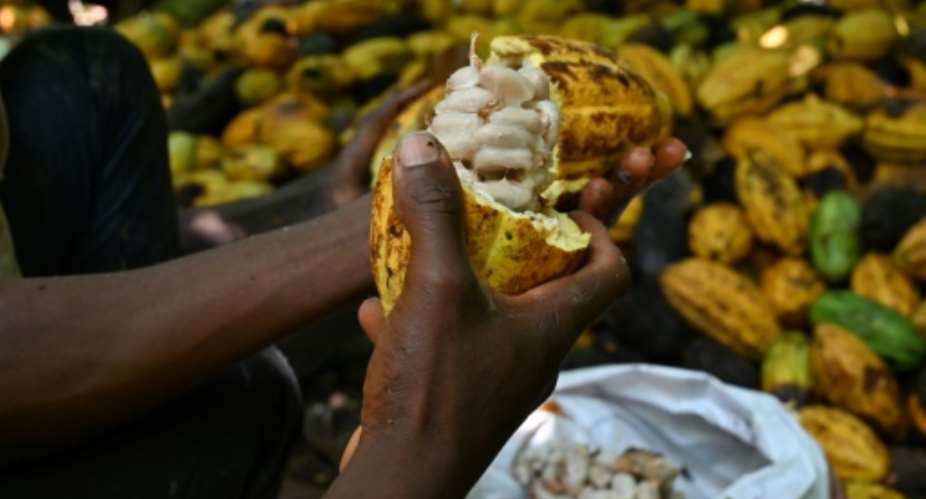Cacao merchants in Ivory Coast on Tuesday attacked a "monopoly" of the world's major purchasers of the raw material for chocolate, and called for local traders to get a greater share of the national market.
In Ivory Coast's latest broadside at international players in the chocolate business, the Group of Ivorian Traders (GNI) said it was time to "end the monopoly" of six corporations who dominate purchases of locally-grown cacao.
"The six multinationals who make purchases in Ivory Coast through their subsidiaries absolutely should be required to systematically allot 20 to 30 percent of their contracts to Ivorian processors and exporters," said GNI spokesman Fabien Guei.
The six are Barry Callebaut and Ecom of Switzerland; Olam of Singapore; the US giant Cargill; and the French groups Sucden and Touton.
Together, they purchase nearly all of Ivory Coast's cacao harvest, more than 80 percent of which is then shipped to Europe.
 Ivory Coast. By (AFP)
Ivory Coast. By (AFP)
"This is not about driving them out of the Ivorian market but to enable Ivorian operators to be a sustainable player in marketing their country's cacao abroad, and in an fairer and more balanced way," Guei argued.
Ivory Coast, the world's biggest producer of cacao, has repeatedly lobbied foreign giants to pay more and for Ivorian firms to get a bigger share of value-added business, such as processing, rather than remain a primary source.
"These multinationals prioritise supplying and exporting (cacao) beans through their subsidiaries in Ivory Coast," Guei said, contending that this amounted to a "brake on local processing."
Ivory Coast accounts for 40 percent of world cacao production. The sector accounts for 40 percent of the country's export income, and 10 percent of its gross domestic product (GDP), according to the World Bank.
It produces around two million tonnes of cacao per year, but less than a quarter of this is processed locally.
The GNI represents Ivorian companies which export and process coffee and cacao. In the cacao sector, its members include 12 exporters and three processors, accounting for 300,000 tonnes annually.
Around one in five of the Ivorian population depend on the cacao sector. Many live in poverty despite booming world demand for chocolate.





 Former Kotoko Player George Asare elected SRC President at PUG Law Faculty
Former Kotoko Player George Asare elected SRC President at PUG Law Faculty
 2024 elections: Consider ‘dumsor’ when casting your votes; NPP deserves less — P...
2024 elections: Consider ‘dumsor’ when casting your votes; NPP deserves less — P...
 You have no grounds to call Mahama incompetent; you’ve failed — Prof. Marfo blas...
You have no grounds to call Mahama incompetent; you’ve failed — Prof. Marfo blas...
 2024 elections: NPP creates better policies for people like us; we’ll vote for B...
2024 elections: NPP creates better policies for people like us; we’ll vote for B...
 Don’t exchange your life for wealth; a sparkle of fire can be your end — Gender ...
Don’t exchange your life for wealth; a sparkle of fire can be your end — Gender ...
 Ghana’s newly installed Poland train reportedly involved in accident while on a ...
Ghana’s newly installed Poland train reportedly involved in accident while on a ...
 Chieftaincy disputes: Government imposes 4pm to 7am curfew on Sampa township
Chieftaincy disputes: Government imposes 4pm to 7am curfew on Sampa township
 Franklin Cudjoe fumes at unaccountable wasteful executive living large at the ex...
Franklin Cudjoe fumes at unaccountable wasteful executive living large at the ex...
 I'll 'stoop too low' for votes; I'm never moved by your propaganda — Oquaye Jnr ...
I'll 'stoop too low' for votes; I'm never moved by your propaganda — Oquaye Jnr ...
 Kumasi Thermal Plant commissioning: I pray God opens the eyes of leaders who don...
Kumasi Thermal Plant commissioning: I pray God opens the eyes of leaders who don...
